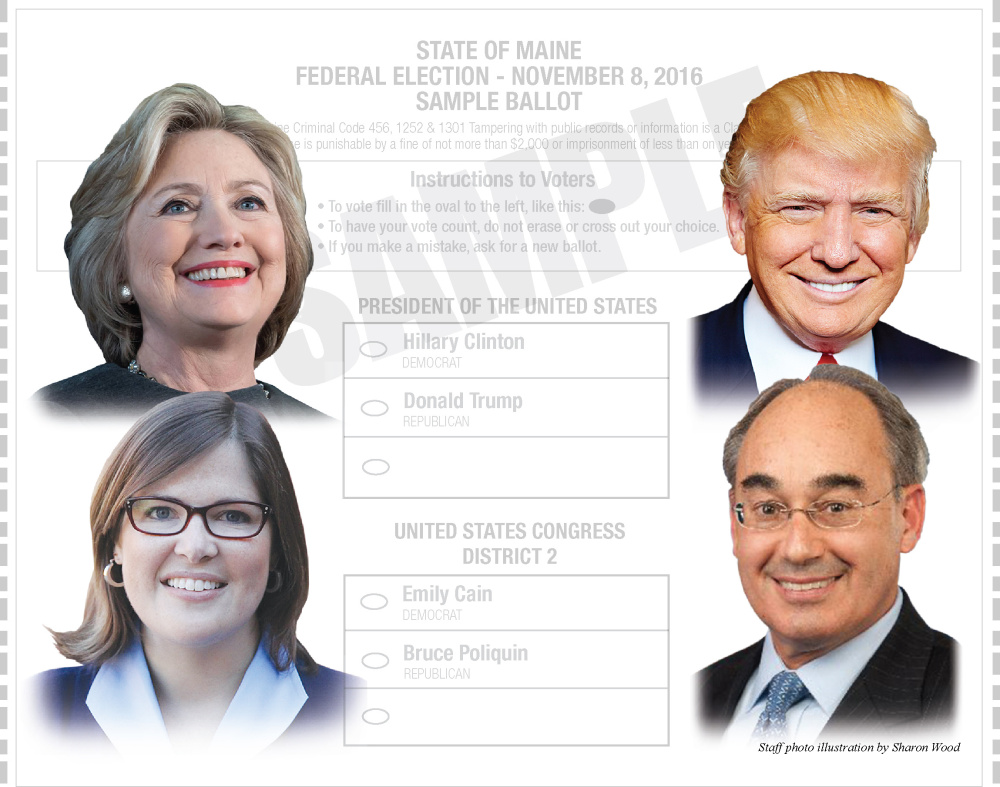How many Mainers vote in the national election, and who they are, could sway the congressional battle.
Mary Lee Rounds of Albion sees only one choice for president in the November election: Donald Trump.
“There’s a negative reason and a positive one,” said Rounds, 72, speaking at a rally for the presumptive Republican nominee last month in Bangor. “The negative reason is I would never under any circumstances vote for Hillary Clinton. The positive reason is that Trump came out and said what everyone was thinking; and if nothing else, we owe him a debt of gratitude for speaking for the common man.”
As Rounds and her husband headed into the Cross Insurance Center for the rally, Emma Macaillen, a Democrat and Bernie Sanders supporter, stood yards away protesting Trump’s presence in Maine with a sign that read, “No sexism, racism, religious bigotry, violence or hatred in Maine.”
“I can’t decide what I’m going to do,” said Macaillen, 73, of Orono. “I’m so tired of voting for the lesser of two evils. I would be terrified of Trump as president, so probably that’s what it will come down to – voting to assure Trump does not get voted in.”
Those kind of feelings are not unusual in a high-stakes presidential race, but could those passions affect races farther down the ticket? Some political observers and voters think so.
Changes in voter turnout and demographics, fueled by the race between Trump and Clinton, could be a deciding factor in the neck-and-neck contest for Maine’s 2nd Congressional District.
REMATCH OF 2014 RACE
It’s a rematch of the 2014 race, in which U.S. Rep. Bruce Poliquin, the former state treasurer from Oakland, narrowly defeated Democrat Emily Cain, a former state lawmaker from Orono.
“Any time you’re talking about the biggest race in the country, which the presidential race is, without a doubt, it impacts all of the races that come below it to a certain degree,” said Mark Brewer, professor and interim department chairman of political science at the University of Maine.
As intensity builds in the 2nd District rematch, the presidential race is taking center stage. The Republican convention will be held Monday through Thursday in Cleveland, while the Democratic convention is to be held July 25-28 in Philadelphia.
Cain was an early and vocal supporter of Clinton, talking openly about her in a recent interview, while Poliquin hasn’t publicly endorsed Trump and has refrained from even saying the candidate’s name. Neither plans to attend the national party convention.
PRESIDENTIAL CHOICE MATTERS
Lance Dutson, a Republican consultant in Maine, called Poliquin’s silence a smart approach, but others said it is only a matter of time before he will be forced to answer the question. In addition to affecting voter turnout and demographics, the presidential race also provides context on lower office races for voters.
“Voters can learn things about other politicians and candidates for office based on who they support and who they endorse,” Brewer said. “I don’t think there’s any doubt that a candidate’s position on the presidential race matters.”
NECK-AND-NECK
A recent Portland Press Herald/ Maine Sunday Telegram poll suggests the race between Poliquin and Cain will be closer than the statewide results for the presidential race.
The poll, conducted by the University of New Hampshire Survey Center, had Clinton leading Trump in Maine, with 42 percent saying they were likely to vote for her, while 35 percent said they would vote for Trump. Another 19 percent said they would vote for somebody else and 4 percent were undecided.
It’s a different story in Maine’s 2nd District, though, where one electoral vote is up for grabs in the presidential race regardless of the statewide outcome. There, the poll found Trump narrowly beating Clinton, 37 percent to 36 percent, with 23 percent saying they would support another candidate and 4 percent undecided among likely voters.
The 2nd District represents about 80 percent of the state.
Cain and Poliquin are locked in a statistical dead heat, according to the poll, with 41 percent of voters supporting Poliquin to Cain’s 40 percent, 12 percent undecided and 7 percent supporting someone else.
Send questions/comments to the editors.



